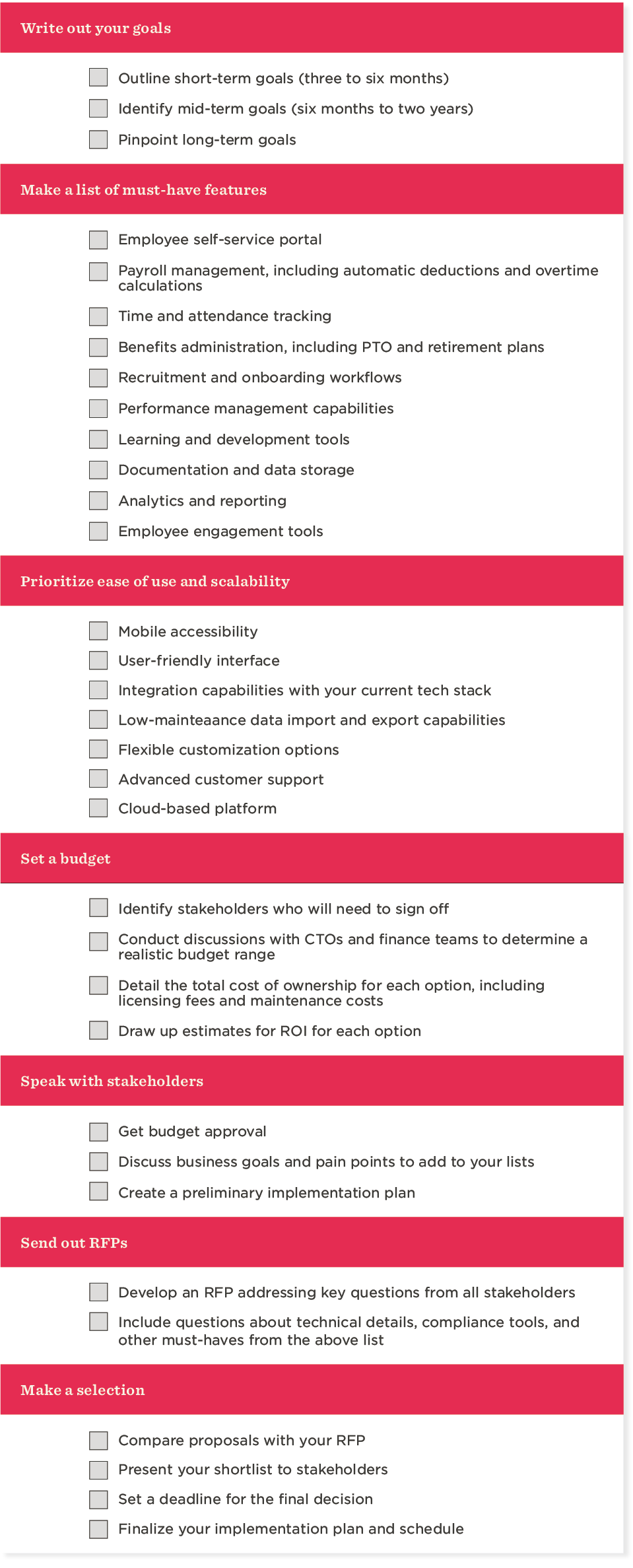Online HR software for small businesses can offer your organization scalable solutions and quick expansion. The right HR software can play a pivotal role in hiring the best talent, planning for the future, and engaging your people.
For small businesses ready to grow and find strategic, scalable solutions to automate their HR processes, it’s time to select an HR software that fits your specific needs.
<<Download our printable checklist to find the best HR software for your business.>>
What is HR software for small businesses?
Online HR software for small businesses helps HR professionals, team members, and managers complete critical tasks while keeping people’s data secure.
While HR software can have different capabilities, common features include payroll processing, benefits administration, and recruitment tracking.
Different business needs can call for different types of HR software, including human resource information systems (HRIS), human capital management software (HCM), and human resource management systems (HRMS).
Why do small businesses need HR software?
HR software helps small businesses make decisions based on concrete, reliable organizational data. When you implement HR software in your company’s early days, you provide a solid foundation for strategic growth and making data-driven decisions that pave the way for long-term success.
You can finally leave spreadsheets and siloed information behind in exchange for flexible software that won’t cause system fatigue.
Features of small business HR software
Small business HR software can vary, but many platforms offer the following features:
- A time and attendance system
- Payroll management
- Recruitment and onboarding workflows
- Performance tracking
- Compensation and benefits administration
- Workforce planning tools
- Employee management software
- Document management and storage solutions
- Analytics and reporting capabilities
- Multi-national compliance management tools
- An employee self-service portal
Benefits of online HR software for small businesses
Top online HR software for small businesses can simplify everyday HR workflows while providing tools to support talent management, employee enablement, and organizational efficiency.
Boost efficiency and productivity
Online HR software automates time-consuming tasks like payroll processing, benefits administration, and absence management. With less manual data entry and repetitive paperwork, HR professionals can focus their time on strategic initiatives without adding headcount.
HR software also boosts efficiency by centralizing your people data: No more juggling spreadsheets and wondering where to find critical information. HR software centralizes information and streamlines workflows, improving efficiency and productivity across all teams.
Improve decision making
Top HR software offers analytics features that keep you ahead of the competition and help anticipate future needs. Access reports on your HR software about employee turnover, retention rates, and performance metrics to make data-driven decisions.
With a single source of truth, your organization can avoid data discrepancies and ensure informed, strategic recommendations.
Support compliance efforts
HR software can support compliance by automating record keeping, quickly generating reports, and providing a reliable and accurate source of all organizational data. It helps small businesses keep up with changing regulations as they expand to new locations or industries.
Enhance employee engagement
HR software improves day-to-day processes for all team members—not only HR professionals. Opt for HR software with capabilities like message boards or shared calendars so that team members from across the organization can connect virtually and engage with one another.
HR software allows team members to play a more active role in their own performance tracking and career pathing. Managers can also access visibility over team performance, while team members can follow clear steps to advance their career. These capabilities keep people engaged in their growth and in the broader organization’s goals, improving overall performance and buy-in.
How to choose HR software for small businesses
Take your time to weigh the benefits and drawbacks of each online HR software to choose the best fit for your small business.
1. Establish your business goals and challenges
The best HR software addresses your core business challenges and enables you to meet your growth goals. Clearly define your business goals and challenges before you begin your research into providers and options.
Whether your priorities revolve around building out your workforce or expanding to new locations, outline short-term and long-term business initiatives and pinpoint current and potential obstacles to growth. Knowing these details is crucial to informing the selection process and ensuring you choose the software that aligns best with your business’s goals.
2. Identify key stakeholders
HR software only benefits your business if your key leaders and teams willingly adopt it. Identify which team members can support a successful rollout. Usually, HR professionals, IT teams, and the C-suite are at the top of this list.
3. Consider other tools and integrations
HR software makes maximum impact when it integrates with the rest of your tech stack seamlessly. Look for vendors that are compatible with your current systems. (Tip: Include a section on your request for proposal (RFP) that lists the software you currently use.)
Eliminate data silos and clunky integrations with all-in-one HR software that offers all the HR capabilities you need. This can reduce costs and keep workflows productive and integrated, allowing your small business to scale efficiently.
4. Review features and capabilities
With your goals, challenges, and existing tech stack in hand, review the features and capabilities of top online HR software for small businesses. Do their tools address your core challenges? Will they help move the needle toward your organizational goals in the short and long term?
Keep detailed notes to sift through the many options on the market and narrow down your list to only the tools that fit your needs.
5. Prioritize scalability
As a small business, the last thing you need is to adopt new software—only to reach system fatigue in a year when you increase your workforce or expand sites.
To ensure that your new system’s capabilities will keep up with your future plans, prioritize localization capabilities, flexibility, and simple integrations.
6. Consider costs and budget
Balance your software feature and capability needs with your budget. And remember: It’s not just about initial software costs, but implementation time, training expenses, and maintenance fees.
Consider ROI as well. Even if a certain platform is more affordable initially, software with advanced automation capabilities and scalability pays dividends in efficiency, productivity, and consistency over time.
7. Get approval from all stakeholders
Be prepared to field topical questions from different stakeholders on each team. For example, your finance team may ask questions about expected ROI, while your IT team could ask technical follow-up questions about implementation processes. Take time to address questions about the software and discuss an implementation plan.
Leverage relationships with the sales team from each vendor to gather in-depth answers so every stakeholder feels comfortable enough in your chosen solution to sign off. Once you have signoff, it’s time to adopt, train, test, and iterate.
<<Download our printable checklist to find the best HR software for your business.>>
Recommended For Further Reading
- Best enterprise HR software systems
- What is the difference between HRMS and HRIS software?
- HR software explained: Unpacking the basics of human resources software
- HR Software for Medium Businesses
- HR systems for small businesses: The complete guide
- Helpful HR growth tools for small business
- Rippling vs. Gusto vs. HiBob: Features, pricing, benefits
- Best HR software for small business
Free checklist to choose an HR software for your small business

<<Download our printable checklist to choose the best HR software for small businesses.>>
Choose the right online HR software for your small business with a criteria checklist
With the right HR software, your people team can flourish while your business grows. Look for a software solution that’s scalable, user-friendly, and integrates with your existing tech stack so you’re equipped to handle payroll, recruitment, employee engagement, and compliance as your company expands.
The checklist serves as a guide for you to clarify your needs and must-haves so that you can identify the top fit for your business and achieve new growth.
<<Download our printable checklist to find the best HR software for your business.>>
